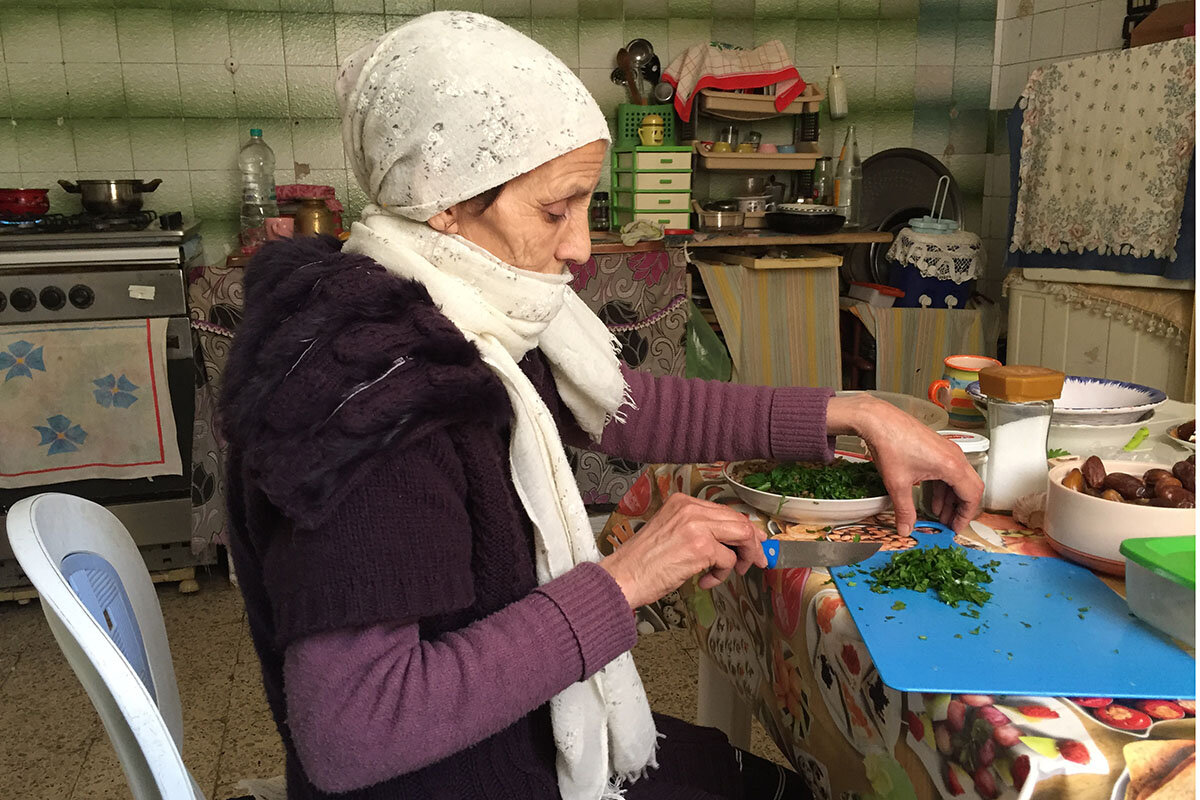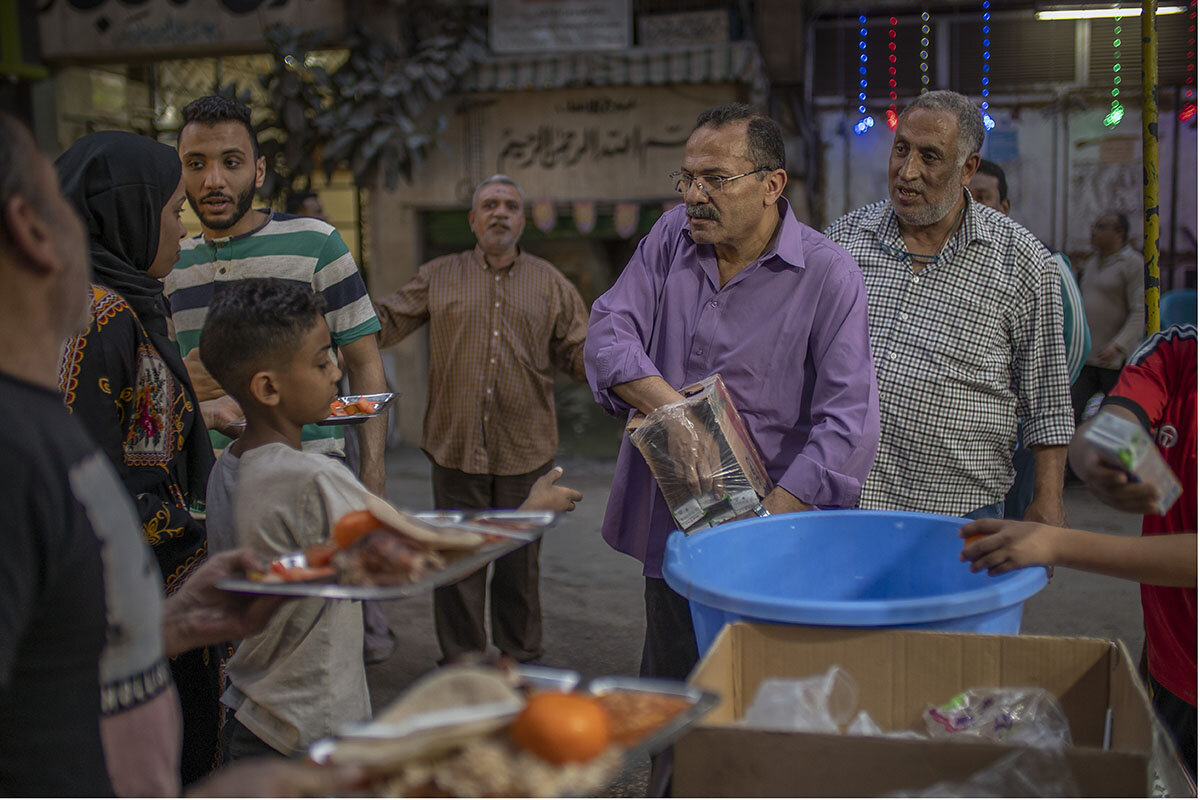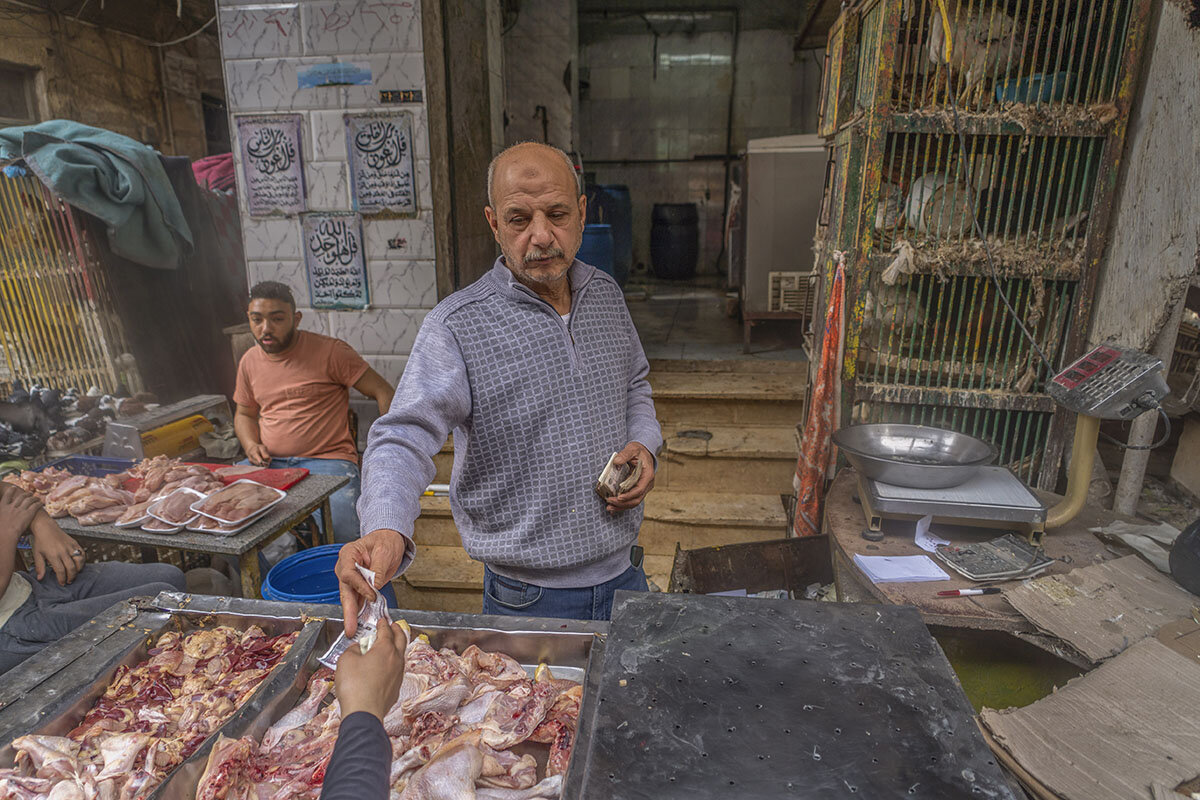Ukraine war food crisis hits Arab world markets, right at Ramadan
Loading...
| Tunis, Tunisia; Cairo; and Amman, Jordan
For Fadhila Khalfawi, it has been a Ramadan full of surprises.
On the first day of the holy month, the Tunis resident spent an hour and a half waiting in a bakery line to grab the last baguette. On the second day, there was no bread to be found.
Unable to find semolina pastry dough or afford eggs, she had to cut out brik – the fried pastry that has long been a staple on every Tunisian iftar table.
Why We Wrote This
What does the world’s interconnectedness mean at a personal level? For Muslim Arabs this Ramadan, it means someone else’s war is an unwelcome guest at a depleted holiday table.
She now breaks her daylong fast with a solitary soup and salad.
“I don’t really know a lot about war, but from what I can see, this war is taking place in Ukraine, but its impacts are being felt in Tunisia,” Ms. Khalfawi says.
“Suddenly there are a lot of dishes that we can no longer cook because they need eggs and cheese,” she says. “To be honest, I just can’t do it this year.”
As the Russian war in Ukraine wreaks havoc on global food and energy prices, its pains are being acutely felt in the Middle East and North Africa, a region that relies on wheat, grains, and cooking oil from Black Sea countries.
Soaring prices and food shortages are hitting Arab countries all at once at the onset of Ramadan, a holy month of daylong fasting marked by festive nighttime meals, gatherings, and peak consumption.
Muslims across the Arab world who had hoped to be emerging from a pandemic-fueled economic and social downturn this spring and celebrate are instead spending this Ramadan finding ways to cut corners, pay bills, and do more with less.
Food price index
United Nations officials have warned that the Middle East, where millions were already spending more than a third of their income on food, would be the region hit the hardest by the war’s impact on the global food supply.
The U.N. Food and Agriculture Organization says its food price index rose 12.6% in March, reaching the highest-ever levels since its inception, with global wheat prices rising 19.7%, vegetable oil by 23.2%, and grains 20.4%.
The World Food Program warned in a statement at the start of Ramadan that “this crisis is creating shock waves in the food markets that touch every home in this region. No one is spared.”
Tunisia, which receives half its wheat from Ukraine, is feeling the shock.
Cooking oil, semolina, and rice have all but disappeared from grocery stores, and flour shortages have led to a run on bakeries – dramatically altering the iftar table.
Along with brik, also disappearing is tabouna, the thick semolina flatbread that is a Ramadan staple and is baked in the oven at home or in clay earthen ovens and sold at local markets. Another casualty is mlawi, a doughy chapati-like semolina flatbread Tunisians serve with iftar or use as a sandwich wrap for a sohour pre-dawn meal.
Ferjani Hergli, a father of two, is one of many Tunisians facing soaring prices since late February. His food bill is up 50% from February – what was once a $33 grocery run now costs $50 – and soaring meat and vegetable prices are forcing his family to make hard choices on what to serve.
Instead of a multiple-course meal with meat-stuffed peppers or lamb couscous, this year they are eating vegetarian couscous or pasta.
“Even during the peak of coronavirus outbreaks, bakeries worked as normal and everything was available,” Mr. Hergli says. “We have never seen bread, meat, and vegetables disappear from the market like this.”
Freezing prices in Egypt
Egypt – with 110 million citizens, the Arab world’s most populous country – relies on Ukraine and Russia for a combined 80% of its wheat imports.
Egypt saw inflation hit 12% and its currency devalued in March; war-caused shortages and rising energy costs led to a jump in commodity prices across the board.
With bread prices alone up 25%, Cairo fixed the price of both subsidized and unsubsidized bread to limit the fallout. But this Ramadan, price hikes are being felt by middle-class and working-class Egyptians who rely so much on bread that it is simply known as aysh, or “life.”
Egyptian bakers buying wheat at a 40% higher price say they are baking lighter loaves to keep prices steady.
Um Zenhom, age 72, lives with her two sons who work as day laborers. Although they would be classified as economically vulnerable, and were recently relocated into government housing, they had never faced food shortages before.
“This is the first Ramadan we can’t get everything we need,” Um Zenhom says.
Her family has given up their staple iftar of four rice-stuffed chickens and meat pasta; now they share a single chicken – when possible. Many of her family’s iftar meals consist of meatless pasta and tomato sauce. She can no longer afford crushed chili peppers, cardamom, or black pepper.
“The days of the coronavirus pandemic were much easier; things were cheaper and we had more money,” she says.
This Ramadan’s economics are hitting businesses as well as families.
Sweet shops selling kunafa in Cairo are largely empty, the orange-crusted custardy dessert now a luxury many Egyptians are willing to cut. In Amman, several restaurants are canceling their iftar buffets after a poor turnout.
Butcher Hajj Mahmoud Elroby sits at his empty poultry stand in Cairo. With poultry prices up as much as 50% in the last month, his is a hard sell.
“Customers won’t buy chicken because it’s too expensive; there is no demand,” Mr. Elroby says. “During Ramadan we should be at home having finished selling our stock by midday. But now we stay until night without selling anything.”
In Tunisia, the shortage of semolina has led to a run on white baguette bread, leaving bakeries empty by noon.
“We have been able to keep up production for now, but the high demand and anxiety of people makes us run out early,” says baker Mohamed Allagui, noting that Tunisia’s wheat shortage will be fully felt only next month.
Silver lining
The rising prices have also changed the way many Muslims meet.
In Jordan, many families mark the first two weeks with large iftar banquets with aunts, uncles, in-laws, and grandparents, with extended families rotating hosting duties daily.
With food costs compounding an economic crisis, many Jordanians say they are breaking fast with their nuclear families – a habit that began during the pandemic.
“The prospect of hosting is such a burden. Many people are too shy to discuss it or accept an invitation because they know the impact on a household that is already facing so many costs,” says Hishem Saeid, an Amman barber who has iftar with his nuclear family and his parents. “Expectations for Ramadan are changing. We are changing with the economic times.”
But there are silver linings in a holy month known for charity.
One is Mohamed Shemies’ charity kitchen, where volunteers serve up chicken, rice, dates, and sweet Ramadan hibiscus juice to underprivileged people, workers on the job, or simply anyone in need of a meal in Cairo’s Abideen neighborhood.
Recent inflation has raised the kitchen’s costs from $1.2 to $2 per meal.
But private donations of meat, rice, and poultry have increased, allowing Mr. Shemies to serve up 350 free meals a day.
“People’s charity has increased more this Ramadan, and there are a lot of volunteers,” he says, adding that despite rising prices, “we are finding ways to share joy for the sake of God.”
Ahmed Ellali reported from Tunis, Hamada Elrasam from Cairo, and Taylor Luck from Amman.








